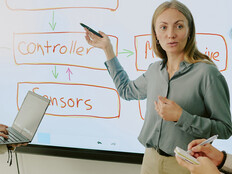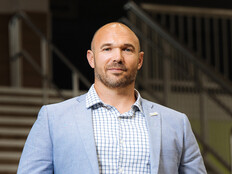BVSD Serves Up Real-World Learning for the Innovation Generation
Patrick Hutfless, a 17-year-old junior at Blue Valley North High School in Overland Park, Kan., heads to school some Saturdays simply because he wants to. "I don't mind coming in," he says. "I actually enjoy it."
You won't hear that from a lot of high school students, many of whom are annoyed to be dragged out of bed before noon on Saturdays. But then, Hutfless doesn't go to just any high school.
Five days a week, he leaves Blue Valley North at lunchtime to work on mobile phone apps that will be distributed by a local company. And he does it to earn high school and college credit, in a school building, on school time – even on Saturdays.
Hutfless is one of about 510 students in the Center for Advanced Professional Studies program. Launched at the start of the 2009-2010 school year, Blue Valley School District's state-of-the-art CAPS program offers local juniors and seniors hands-on, real-world work experience and content learning opportunities in professions ranging from biological sciences and business to media, technology, engineering, education, medicine and even the law. The program is designed so that students can learn from and work with industry leaders and companies during school hours, as they would in a college-level internship, while keeping their regular high school learning on track.
"This profession-based learning model doesn't exist anywhere else in the nation," Executive Director Donna M. Deeds says of the program, which she and her staff developed from scratch when they couldn't find a model resembling what they envisioned.
For students such as Hutfless, CAPS is nothing short of amazing. "Before this, I knew nothing about developing for Android," he says. "Now, I have a full Android app ready to go on the market, and I learned all of it from coming here."
The program, Hutfless adds, "is definitely intense, but it's really phenomenal."
Partners in Progress
When the program debuted in August 2009, it ran out of seven local satellite centers operated independently by CAPS' business partners. A year later, when the newly built CAPS facility in Overland Park opened, all but one of those programs transitioned to the new building. (A CAPS business partner continues to operate the remaining satellite center.)
But some of the real work happened as far back as 2005, when the Blue Valley school board and superintendent embarked on a feasibility study. Deeds and her team contacted local businesses to find instructors and real-world projects for the students to do. "We reached out in a fashion that's unusual for educators, asking them what they thought we should teach," she explains. "They began to see that we were really listening, and that we wanted them on our team for curriculum design. We wanted authentic labs, we wanted the equipment they really use."
The businesses immediately saw the program's potential value, she says. Most offered their time and expertise, and some even donated equipment and learning space.
"We knew these businesses had emerging trends and markets, and that they would need workforce talent in the near future," Deeds continues. "There are a lot of bioscience opportunities in the area, for example, and a shortage of people to fill them. Through this program, the businesses potentially could recruit students sooner than they had been doing."
They also can tap into young minds, which are both more technologically experienced than previous generations and eager to learn. "Our business partners receive free, very talented labor," she says. "They may not have videographers on staff, for example, who can create the level of product these students can provide."
The program is a win for students as well, she says. "They're exposed to real work, and they have a portfolio to take to college that's real." They also get to explore new careers and potentially identify a major to pursue in college before even setting foot on a campus.
Hutfless confirms the power of these benefits. "I'm working on a mobile app for a medical records company now," he says. "We've gone there and met with our contacts, who are all super cool, smart and friendly. They're teaching us what we don't know how to do, and there's [even] some talk about having this turn into a paid internship at some point. This is literally one of my dream jobs."
Live and Learn
Hutfless and his fellow students spend two and a half hours of every school day working at the CAPS facility. Some work in the morning and attend their regular classes in the afternoon, while others go to their high school in the morning and go to CAPS after lunch.
The facility itself is especially unique in K-12 education, Deeds says. "Our partners helped us design the space, so all the labs are industry-standard," she explains. Businesses also recommended and donated equipment to ensure that the students are working with the same machines and software they would use in a real job. In addition to digital signage, the building is equipped with video cameras, handheld mobile devices, 3D printers for rapid prototyping, projectors, document cameras and other 21st century technologies that enhance the learning experience.
And because the program is designed to mimic the feel of a real job, no detail was spared in designing the curriculum. "We treat the students as professionals," Deeds explains. "We have a dress code. We follow attendance practices just like aworkplace. All of the students, whether they're working in engineering or IT or business, learn business ethics. We teach project management, time management and interviewing skills, along with resume building and lessons on networking."
Deeds says students are accepted to the program on a yearly basis and can spend up to four semesters at CAPS working on projects for which they earn both high school and college credit. The program has a capacity of 1,000 students, and Deeds says interest has grown exponentially since its launch. "We take students from all five district high schools, as well as from private schools and home-school students who live in our district boundaries," she says.
The program doesn't require a minimum grade point average; that way, students who haven't maintained a perfect GPA in their regular coursework but have interest in CAPS' offerings aren't excluded. "All are welcome if they're capable and willing to put forth the level of work we expect," Deeds explains. "They have to agree to be professionals. For part of the day, they're thrown into that world."
Along with the business partners who work with students on their CAPS projects, Deeds says the faculty includes certified high school teachers and professionals looking for new career paths. "We have one instructor who's been an engineer for 31 years and wanted a different career," she says. "He's getting his provisional teacher's license. We have someone in the sports medicine program in a similar situation."
Even if a student doesn't enjoy the program he or she has chosen, all is not lost. In fact, Deeds says, that can be the greatest lesson of all. "Some kids figure out that they hate this and they don't want to do it," she says. "They can take a different course the next semester and figure out if something else might be of interest, and they've never spent a dime on college."
Hutfless says enrolling at CAPS has been one of the best things he's ever done for himself. "I was bored last year," he admits. "I didn't really pay attention in school. This gives us something to work toward, and it gives me a great reason to go to school. This makes going to school actually worth it for me."
And that's part of the point, according to Deeds. "Our students are thrown into a profession as if they already had a degree," she says. "They are doing the real work of engineers – at 17 years old."
After grades 9 or 10, 40% to 70% of high school students in Austria, Denmark, Finland, Germany, the Netherlands, Norway and Switzerland opt for an educational program that combines classroom and workplace learning.
SOURCE: Pathways to Prosperity Project (Harvard University Graduate School of Education, February 2011)
Attracting Attention
Although it hasn't been copied to date, Executive Director Donna M. Deeds says the Blue Valley School District's Center for Advanced Professional Studies is getting plenty of attention from nearby districts and colleges.
"We've had many districts come through," she says. "We also developed what we're calling 'articulation agreements' with the colleges so they'd give our students credit for this work. They were pleased to sign off, because this is really college-level work our students are doing."
Already, those CAPS students who have gone on to college are "blowing the socks off their professors," Deeds says. Not that she's surprised by this. "They've already been exposed to the tools they need, the language and the professionalism here," she says.







